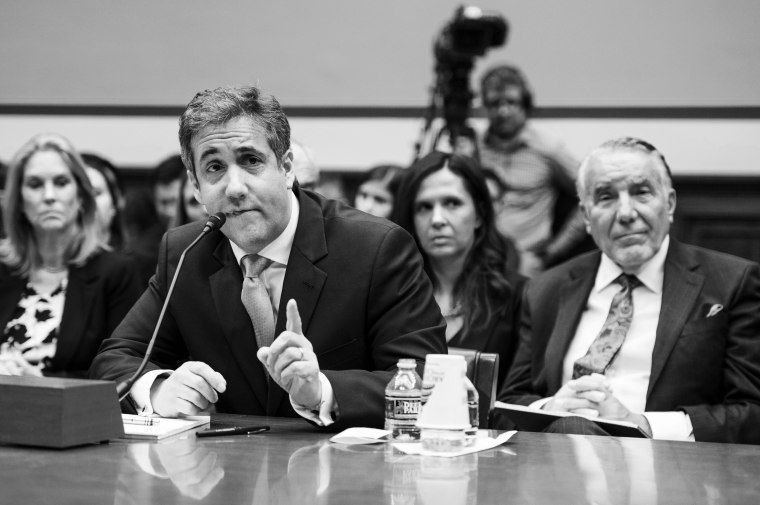The summary of the phone call between President Donald Trump and newly elected Ukrainian President Volodymyr Zelenskiy offers a shocking and illuminating look at how Trump operates, particularly when he purports to conduct foreign policy as president of the United States. But the conversation shouldn’t surprise those who listened to Trump’s personal lawyer and longtime fixer Michael Cohen testify before the House Oversight Committee. Indeed, as House Democrats move toward impeachment, Cohen’s testimony provides important context for the scandal.
In his testimony in February before the House Oversight Committee, Cohen provided a clear explanation of the president’s ways and methods.
In his testimony in February before the House Oversight Committee, Cohen provided a clear explanation of the president’s ways and methods. (Cohen, of course, speaks from experience, as he is presently serving a prison sentence for, among other things, campaign finance crimes he allegedly committed at the urging of and in concert with Trump.) Cohen’s explanation is helpful now as pundits and lawmakers debate whether Trump was truly trying to pressure a foreign leader into trading aid for dirt on a political opponent. Was Trump strong-arming the Ukrainians to do his bidding? Was Trump explicitly trading American foreign policy for his personal gain? These questions will certainly be part of any impeachment inquiry.
According to Cohen, Trump doesn’t order anyone to lie or commit crimes. “That is not how he operates,” Cohen said in his testimony before the House Oversight Committee. Trump is more subtle than that. Cohen explained, for example, that during the 2016 campaign, while he was negotiating with Russian officials to build Trump Tower Moscow, Trump often asked how the negotiations were going.
At other times, Cohen said, Trump would look him in the eye and tell a baldfaced lie. He’d say that he had “no business in Russia.” Trump would then go out and tell the American people the same lie. “In his way,” Cohen explained, “he was telling me to lie.” Specifically, Cohen understood that “no business in Russia” was the lie he was supposed to tell the public. When Cohen was called to Congress to testify in 2017, Trump let Cohen know that his personal lawyers would review Cohen's statement to Congress. Cohen then understood Trump expected him to repeat this lie about Russia to Congress.
Former FBI Deputy Director Andrew McCabe tells a similar story. As McCabe explained in an interview with CBS' "60 Minutes" in February, after Trump fired FBI Director James Comey, Trump summoned McCabe to a meeting. Trump offered a “gleeful” account of the Comey firing which was, according to McCabe, untrue. But McCabe also understood that Trump was signaling him to “adopt” the false narrative.
Now back to Trump’s phone call with Zelenskiy. After Zelenskiy said he wanted to buy Javelins (anti-tank weapons) from the U.S. for defense, Trump told Zelenskiy what he wanted. “I would like you to do us a favor though, because our country has been through a lot and Ukraine knows a lot about it.” Trump went on to say, “I would like to have the attorney general call you or your people and I would like you to get to the bottom of it.” Trump next talked about how a Ukrainian prosecutor was “very good and he was shut down and that’s really unfair.” Trump then brought up Biden’s son and said “a lot of people” want to find out what happened, “so whatever you can do with the Attorney General would be great.”
Next Trump told Zelenskiy an outright lie. He said, “Biden went around bragging that he stopped the prosecution so if you can look into it. ... It sounds horrible to me.” In this way, he was signaling to Zelenskiy what lie he wanted told.
This means Trump was not only asking Zelenskiy to open an investigation into his political rival as a favor, he also signaled that he wanted the investigation to focus on whether Biden had done something “horrible." Put more bluntly, Trump was signaling to the Ukrainian president what false narrative he wanted adopted.
Put more bluntly, Trump was signaling to the Ukrainian president what false narrative he wanted adopted.
There was more. Trump was inviting Zelenskiy into what Zelenskiy understood to be a “strategic partnership.” Trump was drawing him in. Zelenskiy — by ordering an investigation and manufacturing some evidence — could help get Trump re-elected. Trump, in turn, would help him. Toward the end of the conversation, Trump said, “Your economy is going to get better and better I predict.”
Now let’s face it, Trump was unlikely to say, “Look, Zelenskiy, I am unlawfully withholding money allocated by Congress to help you defend your country against Russian aggression unless you help me gain unfair advantage in the 2020 presidential election by fabricating corruption claims against Joe Biden and his son.” But it doesn’t take a codebreaker, a cryptologist, or even Michal Cohen to help us read between Trump’s lines.
In his February congressional testimony, Cohen also explained why someone might take Trump’s bait. “Being around Mr. Trump was intoxicating,” Cohen told lawmakers in February. “When you were in his presence, you felt like you were involved in something greater than yourself — that you were somehow changing the world.” Anyone who has read “The Godfather” also recognizes the tactics: silky threats that are not really threats, people leaping to do the bidding of the mob boss because he makes them want to do it.
It’s obvious that Trump was conducting foreign policy to benefit himself and to help crush a political rival in order to bring about his own re-election. What’s notable is that his methods follow closely the methods he’s used in the past, as described by Cohen, his former personal attorney, and McCabe, the former FBI deputy director.



